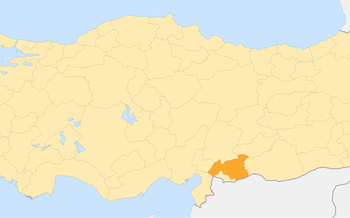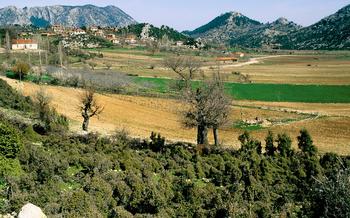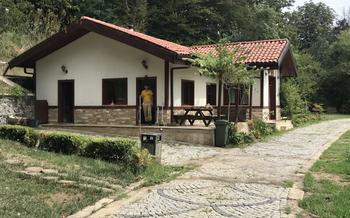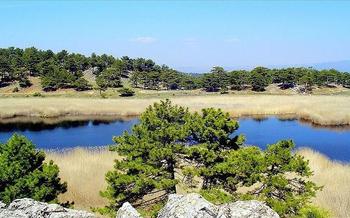
Pamukkale University Botanic Garden
- The Pamukkale University Botanic Garden: A Unique Destination
- A Haven for Plant Diversity
- Strolling Through the Thematic Gardens
- Admire the Stunning Views
- A Place for Relaxation and Reflection
- Engaging Educational Experiences
- A Taste of Local Culture
- A Destination for All Seasons
- Photography and Nature Appreciation
- Wildlife Encounters
- Sustainability and Conservation
- Research and Collaboration
- Events and Workshops
- Insider Tip: Hidden Gems
The Pamukkale University Botanic Garden: A Unique Destination
In the heart of Denizli, Turkey, lies a botanical paradise that combines natural beauty with scientific significance. The Pamukkale University Botanic Garden is a captivating oasis that offers visitors a unique and unforgettable experience. Established in 1995, the garden has grown into a world-renowned institution dedicated to plant conservation, research, and education.
Nestled amidst the stunning landscape of Denizli, the garden's location is both accessible and serene. It is easily reachable by public transportation or private vehicles, making it a convenient destination for nature enthusiasts. The admission fees are nominal, allowing visitors from all backgrounds to enjoy the garden's wonders. The opening hours are flexible, and the garden is open throughout the week, except for Mondays.
Before embarking on your exploration, it's essential to gather practical information to make the most of your visit. Maps and brochures are available at the entrance, providing an overview of the garden's layout and highlights. Visitors can also download a mobile app that offers interactive guides and information about specific plants. Guided tours are available upon request, providing an in-depth understanding of the garden's history, flora, and significance.
A Haven for Plant Diversity
The Pamukkale University Botanic Garden is renowned for its exceptional plant diversity, boasting over 12,000 species from various corners of the globe. Visitors are greeted by a symphony of colors, textures, and fragrances as they wander through the meticulously arranged gardens. The collection includes a vast array of native Turkish plants, some of which are rare and endangered, as well as an impressive representation of exotic species from different climates and ecosystems.
One of the highlights of the garden is its collection of unique and endangered plant species. Visitors can marvel at the delicate beauty of the ghost orchid, a rare epiphytic orchid native to Florida, or catch a glimpse of the critically endangered Mediterranean monk's-hood, a striking perennial known for its vibrant blue flowers. The garden also houses a significant collection of cacti and succulents, showcasing the incredible diversity and adaptations of these fascinating plants.
Beyond its aesthetic appeal, the Pamukkale University Botanic Garden plays a crucial role in scientific research and conservation efforts. The garden's extensive plant collection serves as a valuable resource for researchers studying plant taxonomy, ecology, and genetics. The garden's staff actively participates in conservation initiatives, collaborating with other botanical institutions and organizations to protect threatened plant species and their habitats.
To enhance visitors' understanding of the plant kingdom, the garden offers a range of educational programs and initiatives. Guided tours led by knowledgeable botanists provide in-depth insights into the various plant species, their habitats, and their ecological significance. Workshops and lectures cover a variety of topics, from plant identification and propagation to sustainable gardening practices. The garden's educational initiatives aim to inspire visitors of all ages to appreciate and protect the natural world.
Strolling Through the Thematic Gardens
The Pamukkale University Botanic Garden boasts a diverse array of themed gardens, each offering a unique experience to visitors. The Japanese Garden transports visitors to the Far East with its serene atmosphere, traditional teahouse, and meticulously manicured landscapes. The Mediterranean Garden showcases the vibrant flora of the Mediterranean region, with olive trees, lavender, and aromatic herbs filling the air with their fragrance.
The Alpine Garden is a haven for mountain enthusiasts, featuring a collection of plants that thrive in high altitudes, such as edelweiss and gentians. For those seeking a touch of whimsy, the Fairy Garden offers a magical world filled with miniature plants and enchanting sculptures.
Beyond the themed gardens, the botanic garden also features hidden gems waiting to be discovered. Explore the tranquil Water Garden, where water lilies and lotus flowers bloom in harmony. Stroll through the Butterfly Garden, a haven for colorful butterflies and other pollinators. Discover the Secret Garden, a secluded oasis where rare and endangered plants thrive.
To make the most of your visit, plan your route efficiently. Start with the themed gardens closest to the entrance, such as the Japanese Garden and the Mediterranean Garden. Allocate more time for exploring the larger gardens, such as the Alpine Garden and the Arboretum. Be sure to wear comfortable shoes and bring water, as the garden covers a vast area and involves a fair amount of walking.
Admire the Stunning Views
The Pamukkale University Botanic Garden offers breathtaking panoramic views of the Denizli countryside that are not to be missed. From elevated vantage points within the garden, visitors can feast their eyes on a tapestry of verdant landscapes, rolling hills, and distant mountains. The garden's location on a hillside further enhances the vistas, creating a sense of immersion in nature's splendor.
One of the best spots to capture the panoramic beauty of the surroundings is from the upper terrace of the garden. Here, visitors can take in the vast expanse of the countryside, with the snow-capped peaks of the Taurus Mountains forming a majestic backdrop. The contrast between the lush greenery of the garden and the rugged peaks of the mountains creates a striking visual that is sure to leave a lasting impression.
Another recommended spot for photography enthusiasts is the Japanese Garden. The carefully manicured landscapes and serene water features of this section of the garden offer unique perspectives and opportunities for capturing stunning shots. The reflection of the garden's elements in the tranquil waters adds an extra layer of depth and beauty to the photographs.
For those seeking a more intimate experience with nature, there are several secluded corners of the garden where one can enjoy a picnic lunch while taking in the breathtaking views. These spots offer a sense of tranquility and privacy, allowing visitors to fully immerse themselves in the beauty of the surroundings.
Whether you're a seasoned photographer, a nature enthusiast, or simply someone looking for a peaceful retreat, the Pamukkale University Botanic Garden offers a multitude of opportunities to admire the stunning views and create lasting memories.
A Place for Relaxation and Reflection
Amidst the vibrant colors and diverse plant life of the Pamukkale University Botanic Garden, a sense of tranquility prevails, inviting visitors to find solace and reflection. Designated areas throughout the garden offer serene spots for relaxation and contemplation. Whether it's a secluded bench beneath a canopy of trees, a tranquil pond surrounded by lush greenery, or a hidden corner with panoramic views, there are countless places to unwind and connect with nature's calming energy.
Spending time in nature has been scientifically proven to have numerous benefits for mental well-being. The garden provides an ideal setting to escape the hustle and bustle of daily life, immerse oneself in the beauty of the natural world, and rejuvenate the mind and spirit. The serene atmosphere, the gentle sounds of rustling leaves and birdsong, and the vibrant colors and textures of the plants create a sensory experience that promotes relaxation and inner peace.
Personal anecdotes abound of individuals who have found solace and inspiration within the garden's tranquil embrace. Whether it's a student seeking respite from academic pressures, a weary traveler in search of rejuvenation, or a nature enthusiast seeking a deeper connection with the environment, the garden has something to offer everyone. It's a place where one can simply be, surrounded by beauty and tranquility, and allow the stresses of life to melt away.
Engaging Educational Experiences
The Pamukkale University Botanic Garden is not just a place of beauty but also a hub of education and research. The garden offers a wide range of educational programs, guided tours, and lectures throughout the year, catering to visitors of all ages and interests. Interactive exhibits and displays bring the world of plants and nature to life, making learning a fun and engaging experience.
The garden's educational programs are designed to promote environmental awareness and foster a love for nature. School groups, families, and individuals can participate in workshops, guided tours, and lectures that cover various topics related to botany, ecology, and conservation. Expert botanists and educators lead these sessions, sharing their knowledge and passion for the plant world.
One of the highlights of the garden's educational offerings is the "Plant Discovery Tour." This guided tour takes visitors on a journey through the different themed gardens, showcasing unique plant species and their ecological significance. Visitors can learn about plant adaptations, pollination, and the importance of biodiversity.
The garden also hosts regular lectures and workshops on a variety of topics, such as sustainable gardening, botanical illustration, and plant conservation. These events provide an opportunity for visitors to engage with experts, ask questions, and learn more about the fascinating world of plants.
The Pamukkale University Botanic Garden is a place where learning and nature come together. Whether you're a student, a nature enthusiast, or simply someone looking to expand your knowledge, the garden offers a wealth of educational experiences that will inspire and inform.
A Taste of Local Culture
The Pamukkale University Botanic Garden seamlessly integrates Turkish cultural elements into its design, offering visitors a unique opportunity to immerse themselves in the local culture. Traditional Turkish plants, such as the vibrant red poppies and the delicate Anatolian lilies, bloom throughout the garden, adding a touch of local color and charm. These plants hold significant cultural and medicinal value, and visitors can learn about their traditional uses through informative signage and guided tours.
The garden also hosts cultural events and festivals that celebrate Turkish heritage and traditions. These events often feature traditional Turkish music, dance, and cuisine, allowing visitors to experience the vibrant culture of the region firsthand. Visitors can participate in workshops on traditional Turkish crafts, such as pottery, weaving, and carpet making, gaining insights into the skills and artistry of local artisans.
By incorporating local culture into its design and programming, the Pamukkale University Botanic Garden provides visitors with a multi-sensory experience that goes beyond just admiring plants. It is a place where visitors can not only learn about botany but also immerse themselves in the rich cultural heritage of Turkey.
A Destination for All Seasons
The Pamukkale University Botanic Garden is a year-round destination that offers visitors a diverse and ever-changing array of beauty. In spring, the garden bursts into life with a profusion of colorful blooms, from delicate wildflowers to vibrant tulips and roses. The air is filled with the sweet fragrance of blossoms, and the gardens are abuzz with the activity of birds and insects.
Summer brings a riot of color as the garden's many plants reach their peak. Sunflowers, marigolds, and zinnias add bold hues to the landscape, while the water lilies and lotus flowers create a tranquil oasis in the ponds. The garden is a popular spot for picnics and leisurely strolls, as visitors seek refuge from the summer heat beneath the shade of the trees.
Autumn transforms the garden into a tapestry of warm colors. The leaves of the trees turn golden yellow, orange, and red, creating a breathtaking spectacle. The air is crisp and cool, and the garden takes on a peaceful and serene atmosphere. This is an ideal time to visit for those who prefer a quieter and more contemplative experience.
Winter brings a different kind of beauty to the garden. The snow-covered landscape creates a magical and enchanting atmosphere. The bare branches of the trees reach up to the sky, creating intricate patterns against the winter sky. The garden is a haven for wildlife during this time, as birds and animals seek shelter and food among the plants.
No matter what time of year you visit, the Pamukkale University Botanic Garden has something to offer. The garden is a living testament to the beauty and diversity of the plant kingdom, and it is a place where visitors can connect with nature, learn about plants, and find peace and tranquility.
Photography and Nature Appreciation
The Pamukkale University Botanic Garden is a paradise for nature photographers. With its diverse plant life, stunning landscapes, and abundant wildlife, there are endless opportunities to capture breathtaking images. Whether you're a seasoned professional or simply a hobbyist, you'll find plenty of inspiration within the garden's borders.
To make the most of your photography experience, consider bringing a camera with a good zoom lens. This will allow you to capture close-ups of delicate flowers or distant views of the garden's rolling hills. A tripod can also be helpful for stabilizing your camera and ensuring sharp images.
As you explore the garden, keep an eye out for the many photo-worthy spots. The Japanese Garden, with its serene ponds and traditional architecture, is a popular choice for photographers. The Mediterranean Garden, with its vibrant colors and fragrant herbs, is another great option. And don't miss the Alpine Garden, where you can capture stunning shots of mountain flowers and rock formations.
In addition to the garden's many themed gardens, the arboretum is also a great place for photography. Here, you can capture majestic trees from all over the world, from towering cedars to delicate Japanese maples.
Remember, when taking photos in the garden, it's important to be respectful of other visitors and the plants and wildlife. Be sure to follow the garden's rules and regulations, and avoid using flash photography near birds or other sensitive animals.
With its stunning beauty and diverse plant life, the Pamukkale University Botanic Garden is a must-visit for nature photographers. So bring your camera, explore the garden's many hidden corners, and capture the beauty of this unique destination.
Wildlife Encounters
The Pamukkale University Botanic Garden is not only a haven for plants but also a sanctuary for a diverse range of wildlife. As you stroll through the garden, keep an eye out for the many creatures that call this place home.
Birds: The garden's diverse habitats, from wetlands to woodlands, attract a variety of bird species. Listen for the melodious songs of nightingales, the cheerful chirping of sparrows, and the majestic calls of eagles soaring overhead.
Butterflies: The garden's vibrant flowers and lush greenery provide a perfect habitat for butterflies. Observe the delicate wings of swallowtails, the intricate patterns of fritillaries, and the graceful flight of monarchs as they flutter among the blossoms.
Other Creatures: The garden is also home to a variety of other creatures, including lizards basking in the sun, squirrels scampering through the trees, and frogs croaking in the ponds. Keep your eyes peeled for these fascinating creatures as you explore the garden's many nooks and crannies.
The presence of wildlife in the garden is a testament to its ecological importance. The garden provides a safe haven for these creatures, allowing them to thrive and contribute to the delicate balance of the ecosystem.
Personal Anecdote:
During my visit to the garden, I was fortunate enough to witness a rare sight – a family of hedgehogs foraging for food among the fallen leaves. Their tiny snouts and curious eyes filled me with joy and wonder. It was a reminder of the incredible diversity of life that exists within this botanical paradise.
Sustainability and Conservation
The Pamukkale University Botanic Garden is dedicated to promoting sustainable practices and conservation efforts. The garden employs various innovative techniques to conserve water and reduce its environmental impact. These include rainwater harvesting systems, drip irrigation, and the use of native and drought-tolerant plants. The garden also actively participates in recycling programs and promotes the use of environmentally friendly materials in its operations.
The botanic garden plays a vital role in plant conservation. It houses a seed bank that preserves the genetic diversity of rare and endangered plant species. The garden also collaborates with other botanical institutions and organizations to promote the conservation of threatened plants. Through its educational programs and initiatives, the garden raises awareness about the importance of plant conservation and encourages visitors to adopt sustainable practices in their daily lives.
The garden's commitment to sustainability and conservation has earned it recognition and awards from various environmental organizations. It serves as a model for other botanical gardens and institutions that strive to promote sustainable practices and protect the natural world.
Research and Collaboration
The Pamukkale University Botanic Garden is not just a haven for plant lovers; it is also a hub for botanical research and collaboration. The garden's dedicated team of researchers works tirelessly to study and conserve the diverse plant species found within its borders. They collaborate with universities, research institutions, and conservation organizations worldwide to advance botanical knowledge and promote plant conservation.
Through these collaborations, the garden has made significant contributions to the field of botany. Researchers have conducted groundbreaking studies on plant genetics, ecology, and conservation. They have discovered new plant species, documented the distribution of rare and endangered plants, and developed innovative techniques for plant propagation and conservation.
The garden's research findings are disseminated through scientific publications, conferences, and workshops. The garden also hosts visiting researchers and students who come to learn from its experts and conduct their own research projects.
One of the most notable research projects conducted at the garden is the study of the critically endangered Pamukkale travertine plant. This unique plant, found only in the Pamukkale region, is threatened by habitat loss and climate change. Researchers at the garden are working to propagate and conserve this plant, ensuring its survival for future generations.
The Pamukkale University Botanic Garden is a vital center for botanical research and collaboration. Its contributions to plant science and conservation are invaluable, and its work continues to inspire and inform botanists worldwide.
Events and Workshops
The Pamukkale University Botanic Garden hosts a diverse range of events and workshops throughout the year, catering to visitors of all ages and interests. These events provide an opportunity to learn more about plants, nature, and sustainability, while also enjoying the beauty of the garden.
A highlight of the annual calendar is the Spring Plant Fair, held in April or May, which showcases a variety of plants from local nurseries and growers. Visitors can purchase unique and beautiful plants for their own gardens, while also supporting the garden's conservation efforts.
For those interested in learning more about the garden's flora, guided tours are available on a regular basis. Led by knowledgeable guides, these tours offer insights into the garden's design, plant collections, and conservation initiatives.
Throughout the year, the garden also hosts workshops and classes on a variety of topics, such as gardening, plant identification, and sustainable landscaping. These workshops provide hands-on learning experiences and are a great way to connect with fellow plant enthusiasts.
For families with children, the garden offers educational programs and activities during school holidays and weekends. These programs are designed to teach children about plants and nature in a fun and engaging way.
To stay up-to-date on upcoming events and workshops, visitors can check the garden's website or social media pages. With so much to offer, there's always something new to discover at the Pamukkale University Botanic Garden.
Insider Tip: Hidden Gems
Beyond the well-known attractions of the Pamukkale University Botanic Garden, there lie hidden gems waiting to be discovered by those willing to venture off the beaten path. One such gem is the secluded Rose Garden, tucked away in a quiet corner of the garden. Here, visitors can marvel at a breathtaking array of roses in full bloom, their vibrant colors and heady fragrances creating a sensory paradise.
Another hidden gem is the Butterfly Garden, a haven for these delicate creatures. Stroll through the garden's winding paths and observe butterflies of all sizes and colors flitting from flower to flower. The Butterfly Garden is not only a visual delight but also an educational experience, highlighting the importance of butterflies in the ecosystem.
For those seeking tranquility, the Japanese Tea Garden offers a serene escape. Inspired by traditional Japanese gardens, this tranquil space features a meticulously manicured landscape, a calming water feature, and a traditional tea house. Visitors can sip on a cup of tea, immerse themselves in the peaceful ambiance, and find a moment of Zen amidst the garden's serene beauty.
These hidden gems are just a few examples of the many treasures that await those who explore the Pamukkale University Botanic Garden with a sense of curiosity and adventure. Whether you're a seasoned botanist, a nature enthusiast, or simply someone seeking a peaceful retreat, the garden offers something for everyone. So, take your time, wander off the beaten path, and discover the hidden gems that make this botanic garden truly special.









